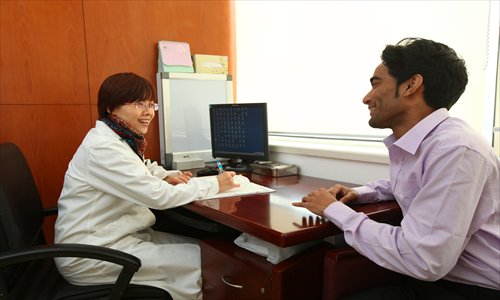
A foreign patient consults a general practitioner at the Huashan Worldwide Medical Center. Photo: Cai Xianmin/GT
A quarter of all the foreigners who live in China live in Shanghai. Some 173,000 foreigners are registered as long-term inhabitants of the city, according to the Shanghai Exit-Entry Administration Bureau. Tourists and short-term visitors numbered nearly 6 million for the past year.
All of these foreigners, however, share a major concern: how will they cope if they are suddenly struck ill or injured. Will they be able to find a competent doctor or hospital that will treat them properly? Will they be able to find competent staff that can understand English (or whichever language is their native tongue)?
"With the continual growth of the foreign community in Shanghai, the demand of healthcare services for them is surging. One of the most important tasks for the health administration is to optimize our healthcare resources and provide the best possible services for them as part of the city's goal of building an internationalized metropolitan medical system," Xu Jianguang, the director of the Shanghai Municipal Health Bureau, told the Global Times at a government meeting in January.
However, healthcare is one of the issues producing the most complaints from foreigners in the city, a survey by the Shanghai People's Association for Friendship with Foreign Countries (SPAFFC) has revealed.
Strange phenomenon
"There is this strange phenomenon in the survey," noted Wang Xiaoshu, the executive vice president of SPAFFC. "The longer foreigners live in Shanghai, the less they like the city. And among the biggest complaints are the problems associated with healthcare here."
The big complaints foreigners had were difficulties in finding good clinics or hospitals, bad attitudes from the staff, no bilingual services and communication difficulties with doctors, complicated procedures and crowds in Chinese hospitals.
Shanghai started to provide international medical services in 1989 when the city's Huashan Hospital established China's first joint venture medical center for foreigners in a public hospital, explained Gu Jingwen, the director of the Huashan Worldwide Medical Center. The center is now one of Shanghai's major medical institutions for foreigners. Every year it handles about 40,000 outpatients and treats nearly 1,000 inpatients, half of whom are receiving surgery.
Later other leading hospitals in Shanghai, including Huadong Hospital, Ruijin Hospital and Shanghai First People Hospital, all opened international medical centers. By the end of 2012, there were 20 Sino-foreign medical institutions in Shanghai providing healthcare for foreigners and they are mostly either public hospitals like Huashan or private medical clinics like Parkway Health.
There are another 10 public hospitals which provide some specialist healthcare services for foreigners. There is only one overseas sole-capital medical institution in Shanghai, the Shanghai Landseed International Hospital which opened in 2012.
"In many Western countries, patients are used to seeing a general medical practitioner first who can advise them if they need to see specialists. But in Chinese hospitals, there are no general medical practitioners and patients sometimes don't know which department they should be visiting and can be confused by the different treatments recommended by doctors," Gu said.
At Huashan, she explained, foreigners could get to see a general medical practitioner first who would then call in specialists if needed. The general practitioner assigned would explain the diagnoses and treatments to the patients and accompany them through the entire process.
"Our nurses accompany the patients throughout and check that they receive the correct prescriptions, helping them avoid misunderstandings with our Chinese medical staff," Gu said. Consequently the fees Huashan charges foreigners are higher than for Chinese patients. A Chinese patient can register as an outpatient for only 10 yuan ($1.61) but foreigners pay 600 yuan.
Gu said the hospital was very aware of the special needs of foreign patients. "We pay close attention to the treatments for different patients. For female patients from the Middle East, we ensure that there is always a woman doctor available." She said that most hospitals in Shanghai could not offer these services for foreign patients.
Misunderstandings
For a long time, misunderstandings and mistrust of Chinese medical treatments along with the fact that foreign insurance companies could not cover public hospitals in China drove most foreigners to seek treatment at private clinics.
Eleven years ago MSH China was the first international health insurance company to sign up Chinese hospitals in Shanghai. CEO Joanne Cao said that at present 70 percent of their foreign clients attend private clinics.
According to Cao, most foreigners in the city either arranged their own health insurance or it was provided by their employers. "Our clients prefer the service and medical environments of private hospitals although many of the leading Chinese hospitals charge much less and offer a high level of medical skills," Cao said.
"In fact we have had several instances where patients refused to go to public hospitals and then encountered problems with private treatment which delayed their recovery."
To help convince their clients of the quality of Chinese hospitals, Cao said her company had sent training teams into the hospitals to coach staff and advise on décor and environment, especially in older hospitals.
"Some Chinese doctors didn't appear to respect their patients or their privacy. And some phrased their descriptions of illnesses crudely and didn't pull the curtains around a bed when they gave injections or other procedures," Cao said.
However, although more leading public hospitals in the city are now covered by health insurance companies, many foreigners still refuse to be treated in them. "Public hospitals did not readily accept the need for private health insurance and the need to attract more patients. As well, foreign patients were reluctant to go to these hospitals because of the poor services," said Gu Zhujun, the account manager for Medilink-Global, which is principally involved in providing regional third party claims administration services and medical second opinion services.
"We have to know everything about the hospitals, the insurance companies and the needs of the patients, and be assured that we are right for each other. We usually have to explain to the foreign patients how these public hospitals operate," she said.
The hospitals also have other concerns. Gu Jingwen, from Huashan Hospital, told the Global Times that most public hospitals didn't have the resources to support a high level of healthcare for foreigners as they were already struggling to cope with Chinese patients.
"Public hospitals in China operate in a totally different way compared to private hospitals which are managed from headquarters overseas and have closer relationships with international insurance companies. We find it difficult to work with international insurance companies because we don't know each other's functions," Gu said.
"As well colleagues from other departments argue that we had used too many resources on providing premium healthcare for foreigners."
Outpatients only
Last year China's Ministry of Human Resources and Social Security introduced a regulation compelling all foreigners working in China to pay social insurance. But foreigners can only use their government medical care insurance in the outpatient clinics of public hospitals, queuing alongside Chinese patients.
"It is almost impossible to get foreigners to do this so the insurance they have paid to the Chinese government is just wasted in most cases," the Huashan Hospital's Gu said.
She suggested the Shanghai government should establish a new healthcare system in Shanghai which would integrate government-supported basic medical care and insurance-backed premium healthcare to encourage more foreigners to attend public hospitals.
Wu Wei, the deputy director of the Life Insurance Regulatory Department at the China Insurance Regulatory Commission Shanghai Bureau, told an industry meeting last September that the major obstacle and challenge for the development of commercial health insurance in Shanghai was the disorganized exchange of information.
"But increasing market demands and policy support from the government will ensure a bright future for premium healthcare services and commercial health insurance in Shanghai," Wu said.
Yan Bo, a director with the Medical Services Regulation Department at the Shanghai Municipal Health Bureau, said the city's public hospitals also needed to improve management and boost services.
"The concept that 'the best interest of the patient is the only interest to be considered' is a core idea that we should learn to implement in our daily work and it is our goal to increase our service quality constantly to serve more foreigners in Shanghai," he said.







